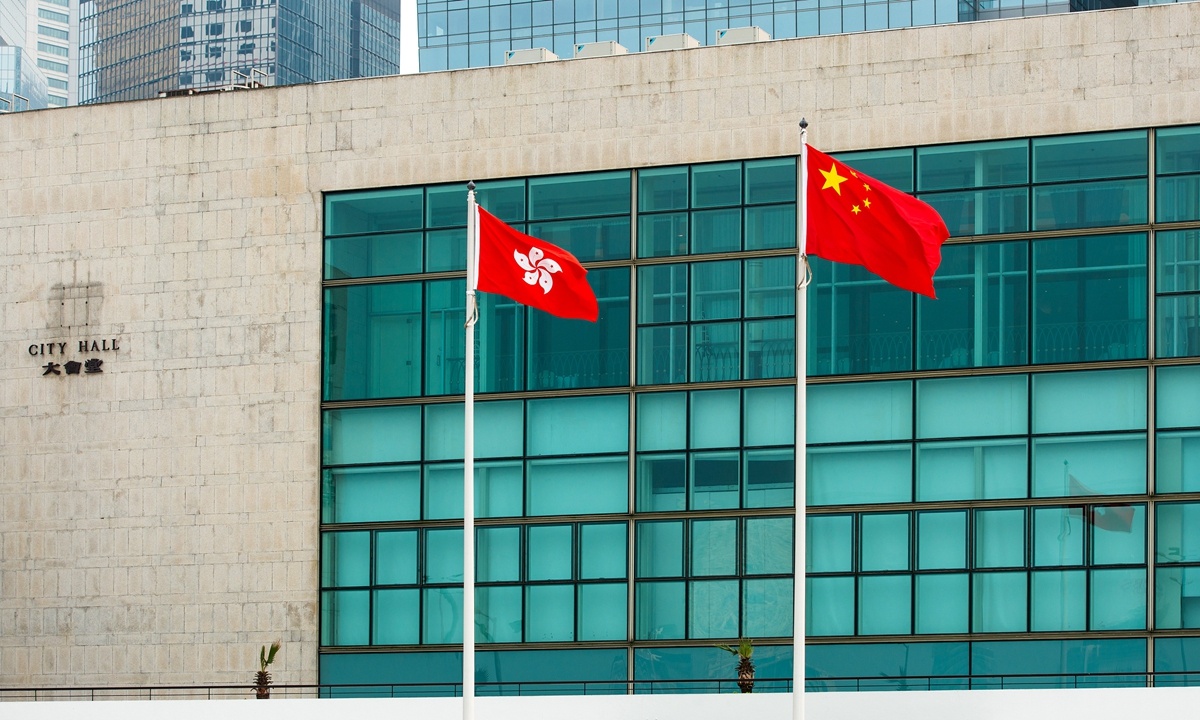Editor's Note:
As the national security law for Hong Kong is set to mark the first anniversary of its implementation on June 30, the Global Times is publishing a series of articles to debunk assertions by Western anti-China forces that the move would seriously undermine the city's economy. This is the second part of the series focusing on small businesses that were battered by violent riots in 2019.

Hong Kong (File photo:VCG)
Tourism, retailing and catering businesses in China's Hong Kong Special Administrative Region (HKSAR), hammered by violent riots in 2019, anticipate a rebound as the national security law has restored order to the city over the past year and COVID-19 cases are expected to drop.
A store owner surnamed Li told the Global Times that his store is located near the police station in Mong Kok, and he was in constant fear of riots in 2019. But now, almost one year after the national security law took effect on June 30, 2020, he is becoming more optimistic despite the pandemic.
"Rioters would come during the weekends, the busiest time of the week. Sometimes I couldn't open my store for an entire day," Li said.
Small businesses in the retailing, tourism and catering sectors were among the hardest-hit by the violent riots in 2019. For example, the number of tourists in Hong Kong, a pillar of local catering and retail businesses, slumped as much as 55.9 percent year-on-year from October to December in 2019, according to a report by the Bank of China.
However, since the national security law was enacted, it's been obvious that the Hong Kong society has gradually become more stable, Ken Wong of the Hong Kong (SME) Economic and Trade Promotional Association, told the Global Times on Monday.
"We believe that Hong Kong will return to its past glory in the near future," said Wong.
Wong, who's also the director of All Times Healthy Co, a healthcare products firm, said that due to the COVID-19, his business has not been greatly improved over the past year, but he is optimistic about a recovery after the epidemic.
"Our products mainly target tourists from the Chinese mainland. As transport has not been resumed yet, the revenue is basically the same," Wong said, adding that he expected a difference would emerge after travel restrictions are lifted.
The tourism industry is eagerly anticipating the return of tourists from the mainland, who account for up to 80 percent of total tourists in Hong Kong.
"The 2019 riots halted almost all arrivals, and we can clearly see that mainland tourists' inquiries about traveling to Hong Kong are becoming stronger after the national security law," a staff member at a local tourism agency in the HKSAR told the Global Times on Monday.
The staff member, who preferred to remain anonymous, said that although local authorities have resumed some local travel and high sea cruises, the market for local travel has always been limited. Without inbound and outbound tourists, the Hong Kong tourism industry may still take a long time to recover.
"The return of mainland tourists is still the most anticipated factor for industry players," said the staff member.
Shiu Ka-fai, a member of the Legislative Council of Hong Kong, told the Global Times that although current requirements for social distancing and seating limits are still affecting the business of restaurants, the owners are generally optimistic because of the calm and orderly environment brought by the national security law.
"Now rioters dare not come to stores and restaurants, and people are relieved," Shiu said.
He also noted that the catering and retailing sectors are hoping for immediate control over the COVID-19 pandemic, and that travel between the Chinese mainland and the HKSAR can resume soon.
"The majority of Hong Kong's visitors come from the Chinese mainland in a normal year. Their contribution to the local economy is unparalleled," Shiu said. "We are proposing to offer coupons to stimulate consumption. In the long run, we are hoping for a swift return of the mainland tourists."
However, while the Hong Kong economy continues to face challenges brought by the COVID-19 pandemic, the improved social environment following the implementation of the national security law already offered great help in the city's response to the epidemic and stabilize economy, analysts said.
Despite impact from the COVID-19, the Hong Kong economy ended six consecutive quarters of contraction in the first quarter of 2021, when the GDP grew by 7.9 percent year-on-year.
HKSAR Chief Executive Carrie Lam said during a speech on Thursday that the national security law has helped guarantee social and political security in the HKSAR and bring a better future in terms of the economy, people's livelihoods and social development.


